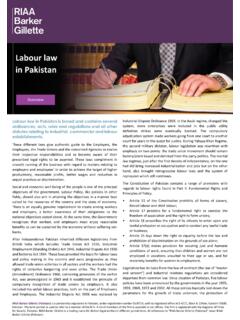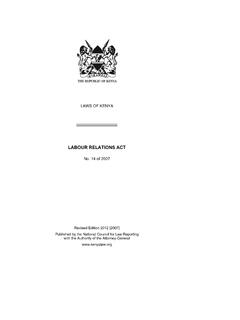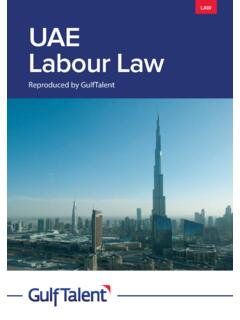Transcription of INDUSTRIAL (LABOUR) RELATIONS
1 Prepared By : Muhammad Saad ( Lecturer IE&M Department, MUET, Jamshoro) 1 INDUSTRIAL ( labour ) RELATIONS INDUSTRIAL RELATIONS , DEFINITION AND CONCEPT - INDUSTRIAL RELATIONS is that aspect of management which deals with the manpower of the enterprise-whether machine operator, skilled worker or manager. - Cordial and peaceful INDUSTRIAL RELATIONS between the employees and the employer are highly essential for increasing productivity and the economic growth of the country. Through good INDUSTRIAL RELATIONS only, the enterprise can move towards the welfare of the employees and the management of the concern. - INDUSTRIAL Relationship is the composite result of the attitudes and approaches of the employees towards each other with regard to the planning, supervision, direction and co-ordination of the activities of an organization with a minimum of human effort and friction, with an animating spirit of cooperation and with proper regard for the genuine well-being of all the members of the organization.
2 - The term INDUSTRIAL RELATIONS has been looked upon and worded differently by different pioneers of the field. Integrated programmes of INDUSTRIAL RELATIONS are of relatively recent origin. Fragmented attention to employee concerns started around World War I and became inclusive during the 1940s. The human- RELATIONS approach is a long term trend toward recognizing the individual interests of workers. Certain people define INDUSTRIAL RELATIONS as-the RELATIONS between employers and employees in industry. Others describe INDUSTRIAL RELATIONS as-the relationships between employees and management that grow out of employment. Still others call INDUSTRIAL Relat ions as-Social relat ions in production. However, with the INDUSTRIAL developments after World War II, the term INDUSTRIAL RELATIONS has been widened in its meaning and now it implies Employers-Employees-Unions and Government relationship in industry.
3 The basic requirements of an INDUSTRIAL -relation programme are (i) To have the support of top management. (ii) To be based on sound personnel policies (iii) To follow proper practices. (iv) To follow up and evaluate the pattern of employee action. The important functions of INDUSTRIAL RELATIONS are (i) Emplo yee Relat ions. (ii) labour RELATIONS . (iii) Public RELATIONS . Prepared By : Muhammad Saad ( Lecturer IE&M Department, MUET, Jamshoro) 2 The important aspects of INDUSTRIAL RELATIONS are (i) Cooperation. (ii) Conflict. labour RELATIONS and Employee RELATIONS Whereas Employee RELATIONS is a broader term which represents the RELATIONS and contacts between the Management and it s (all) employees; labour RELATIONS has its field of contact between Management and employees, limited.
4 In other words unlike Employee RELATIONS , labour RELATIONS represents RELATIONS and contacts between Management and employee representatives (or the union) only. The increased size of today's employers and union organizations have caused the government to become more active in employer-employee relationship and for this reason, Legislation and Government regulations affect considerably the field of labour RELATIONS . The labour RELATIONS department of an industry (i) Deals with management and the labour union in arriving at a satisfactory resolution of problems such as low wages, poor fringe benefits, etc. (ii) Carries out all correspondence with the labour unions. (iii) Participates in Grievance handling. (iv) Represents the company in arbitration cases. (v) Participates in negotiations.
5 (vi) Conducts the necessary correspondence with government labour agencies. In brief, labour RELATIONS Department looks after, (i) Union RELATIONS . (ii) Collective Bargaining. (iii)Discipline in the Industry. (iv) Handling Grievances. Prepared By : Muhammad Saad ( Lecturer IE&M Department, MUET, Jamshoro) 3 TRADE UNIONS OR labour UNIONS Definition The social historians Sydney and Beatrice Webb defined a trade union as: "A continuous association of wage-earners organized for the purpose of maintaining and improving the condition of their working lives". This definition was given in 1920; today it has been widened and includes salary earners as well. A trade union or labour union is a continuing long term association of employees formed to promote, protect and improve, through collective action, the social, the economical and political interest of its members.
6 A trade union may also be defined as any combination, whether temporary or permanent, formed primarily for the purpose of regulating the RELATIONS between workmen and employers between workmen and workmen or between employers and employers or for imposing restrictive conditions on the conduct of any trade or business and includes any federation of two or more unions. Origin of trade Union Trade unions are the creation of industrialization and modern INDUSTRIAL conditions. INDUSTRIAL Revolution destroyed the earlier way of life and left the individual worker, who was protected by the customary values, to drift by himself in the anonymity of the town, and (also) gathered these workers together around the employer. The employer did pay as little as possible to the workers; the workers as individual could not protest against it and therefore those (workers) similarly situated, economically and socially and closely associated with the work of the same employer developed mutual understanding and a common solution of their problems of living and this crystallized them into a self-conscious group what we may call as Trade Union.
7 Trade unions got originated out of the necessity of workers to protect and defend themselves from encroachment, injustice and wrong imposed upon them by the employer or the management of the concern. The aspects of the process of industrialization those necessitated "the origin of trade union is: (i) Separation between the ownership of capital and labour , both of which are essential for producing goods and rendering services to the consumers. A difference got created between the owners of capital and the labour . The former wanted to pay lowest possible to the latter and the latter were interested to secure the maximum possible price for the work done for the former. These two classes with divergent and _ conflicting interests gave rise to conflicting situations and the workers thought of uniting.
8 (ii) Since, individually the workers did not have any other source of the livelihood except that of service under the owners of capital, there was no match between the two as regards economic resources or bargaining power or skill, ft was the owner of capital who dictated the terms and conditions of employment, Le. wage rate, hours of work, etc and either a Prepared By : Muhammad Saad ( Lecturer IE&M Department, MUET, Jamshoro) 4 worker had to serve under those conditions or starve. This again infused a spirit of union among the workers. (iii)When the workers were suffering in this way, the State or Law remained silent because in its eyes workers and employers were equal. This further increased the exploitation of workers by the owners of capital. (iv) Though an individual worker was dispensable to an employer, but he could not afford to dispense with the services of a group of workers.
9 The day it was realised by the workforce, they thought to unite and get their reasonable rights from the owners of capital. Functions of Trade Union Functions of trade unions are: 1. The provision of friendly services such as a place for leisure pursuits, information about jobs existing in other factories, games and outings, etc. 2. The provision of social services such as insurance against old age, unemployment, strike, pay, payment for hospital fee, legal services, etc. 3. Wage bargaining. collective wage bargaining with the employers. 4. Safeguarding the job of the workers. 5. Political activities, the political pressure for reform, trade union legislation works to protect the union and the workers from such INDUSTRIAL abuses as delay in payment of wages, excessive hours of work, poor working conditions, etc, 6.
10 To develop cooperation with employers. 7. To arouse public opinion in favour of labour . 8. To secure some shares in profit and in the control of the enterprise. Objectives of Trade Union Objectives of trade unions are: 1. To take labour out of the competitive process; because if a number of workers freely compete for a job, the employer will definitely offer them less wages'. 2. To negotiate at all levels with employers over wages and conditions of work. 3. To protect the workers in their inalienable right to higher and better life. 4. To make workers to take part in union activities and to obey union rules and decisions. 5. To protect and promote the interests of the workers. 6. To provide legal assistance to workers ( , union members) in connection with work affairs.








